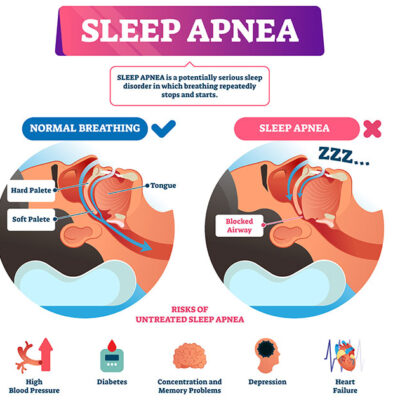It’s no secret that many of us struggle to get good sleep. This may be for any number of reasons. We continue to learn more and more about the importance of quality sleep. Poor quality sleep can have detrimental effects on your teeth and jaw joints as well as on your overall health. As a general dentist, Dr. Jimmy Lutz has a role in helping patients identify those detrimental effects and consider seeking further treatment when necessary.
Possible Causes of Poor Sleep
- Sleep Apnea
- Constricted Airway and Snoring
- Stress/Anxiety
- Underlying health conditions
- Medications
- Depression or Psychological Disorders
Sleep Apnea
Sleep apnea is a dangerous sleep disorder that interferes with healthy breathing patterns during sleep. It is characterized as stopping and starting patterns of breathing during sleep causing the body to work harder to get rest. Sleep apnea and its effects on overall health can be life threatening. Having sleep apnea can also put a strain on relationships, cause daytime fatigue, and even lead to other secondary conditions like depression.
Snoring vs Sleep Apnea
Though snoring is a primary symptom of sleep apnea, not all people who snore actually have obstructive sleep apnea. So, how do you know the difference? Though snoring is a form of labored breathing, it doesn’t necessarily restrict sufficient air flow. Sleep apnea, on the other hand, causes airflow to stop and sometimes results in ‘gasping’ during sleep.
Frequently Asked Questions
Do I need treatment for sleep apnea?
You may need to see a doctor if you or your partner have been awakened by your chronic snoring and/or gasping for air. Though this condition can be very dangerous, your doctor can help you discover ways of managing sleep apnea and protecting healthy breathing during sleep. They will likely start with a sleep study to determine the severity of your condition.
How will my dentist screen for sleep apnea or airway issues?
During your dental exam, Dr. Jimmy will determine if there are any signs or symptoms of a restricted airway that may affect sleep. There are specific warning signs for kids and adults that may have airway conditions. He will go through a series of questions as a part of his screening. For example, acid reflux and night-time clenching or grinding of teeth are signs that could point to possible airway involvement. Chronic snoring is also a possible symptom of sleep apnea. If there are any concerning signs and symptoms he sees, the next step would be to refer you to a physician who can then request a sleep study.
What types of treatments are available for people with sleep apnea?
There are many ways of treating the symptoms of sleep apnea. This may include conservative approaches, such as a new sleeping position or the use of an oral appliance. If your apnea symptoms are severe or conservative treatments are not working, you may be prescribed a continuous positive airway pressure device (CPAP) to open the airway. In severe cases, surgery may be necessary. Keep in mind that a diagnosis of sleep apnea is not always permanent. Many patients find that losing weight can be an effective way of opening the airway during sleep. Whatever the case, please remember the importance of getting a correct diagnosis from a physician before pursuing any treatment options for obstructive sleep apnea.

